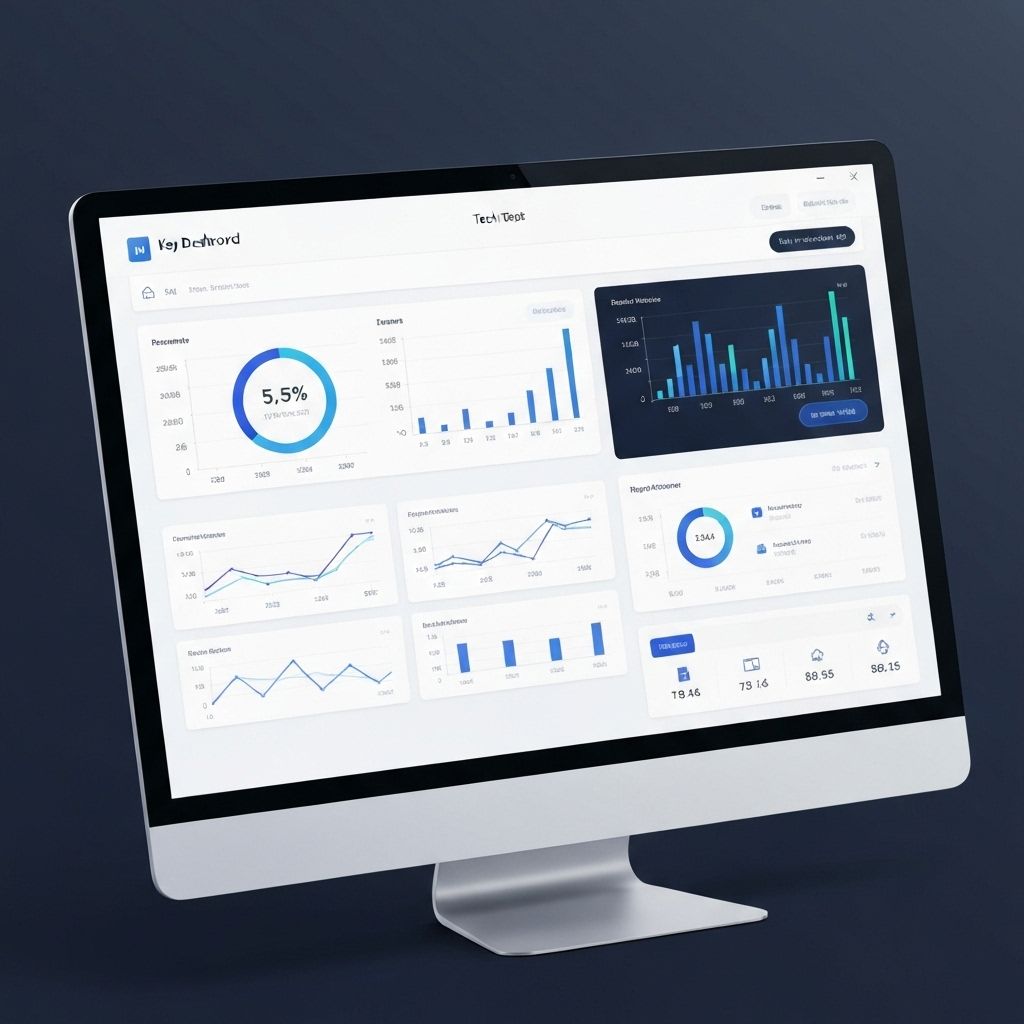If you're running a small business in Kenya and still managing operations with spreadsheets, paper records, or disconnected software tools, you're not alone. But you're also leaving money on the table and making your life harder than it needs to be.
At Karibu WebDev, we've helped dozens of Kenyan small businesses transform their operations with custom ERP (Enterprise Resource Planning) systems. The results? Reduced costs, improved efficiency, and business owners who finally have time to focus on growth instead of firefighting daily operational issues.
What Exactly is an ERP System?
An ERP system is integrated software that manages your core business processes in one place. Instead of having separate systems for accounting, inventory, sales, purchasing, and HR, an ERP brings everything together into a unified platform.
Think of it as the central nervous system of your business—connecting all departments and ensuring information flows seamlessly across your organization.
Key Components of a Modern ERP:
- Financial Management: Accounting, budgeting, financial reporting
- Inventory Management: Stock tracking, reorder points, warehouse management
- Sales & CRM: Customer management, order processing, sales tracking
- Purchasing: Supplier management, purchase orders, procurement
- Human Resources: Employee records, payroll, attendance tracking
- Reporting & Analytics: Real-time dashboards, business intelligence
Why Small Kenyan Businesses Need ERP Systems Now
1. The Cost of Manual Processes is Higher Than You Think
Many small business owners believe ERP systems are only for large corporations. This couldn't be further from the truth. In fact, small businesses often benefit MORE from ERP systems because they're operating with limited resources.
Real Cost Analysis from Our Clients:
One of our retail clients in Nairobi was spending 15 hours per week manually reconciling inventory across three locations. At a conservative rate of KES 500/hour, that's KES 30,000 per month (KES 360,000 per year) just on inventory reconciliation.
After implementing our custom ERP solution, this process became automated and took less than 30 minutes per week. The system paid for itself in less than 8 months, and the business owner could finally focus on expansion instead of spreadsheets.
2. Data-Driven Decisions Beat Gut Feelings
Successful businesses in 2025 are data-driven. An ERP system gives you real-time visibility into every aspect of your business:
- Which products are most profitable (not just which sell the most)
- Which customers generate the most revenue
- Seasonal trends and demand patterns
- Cash flow projections based on actual data
- Supplier performance metrics
Case Study: Manufacturing Company in Mombasa
A manufacturing client came to Karibu WebDev struggling with profitability despite good sales. They couldn't understand why they were always short on cash.
Our ERP implementation revealed the problem: their three best-selling products were actually loss-makers when you factored in all costs. They were subsidizing these losses with profits from other products without realizing it.
With this insight, they adjusted pricing, renegotiated supplier contracts, and optimized their product mix. Within six months, profit margins increased by 35%.
3. Scalability: Grow Without Growing Pains
Many small businesses hit a ceiling where they can't grow further without completely overhauling their systems. This is because manual processes and disconnected tools don't scale.
An ERP system grows with your business:
- Add new locations without multiplying administrative overhead
- Onboard new employees faster with standardized processes
- Handle increased transaction volumes without hiring more staff
- Expand product lines without inventory chaos
Success Story: Retail Chain Expansion
One of our clients started with a single shop in Nakuru. They wanted to expand but were terrified of losing control over inventory and finances.
We implemented a cloud-based ERP system that gave them real-time visibility across all locations. They've since expanded to five locations and are planning three more. The owner told us: "I can check inventory, sales, and cash position for all my shops from my phone while having coffee. I couldn't have expanded without this system."
4. Compliance and Tax Management
Kenya's tax environment is becoming increasingly digital with iTax and eTIMS requirements. An ERP system ensures:
- Accurate tax calculations and reporting
- Proper documentation for KRA audits
- Automated VAT tracking and filing
- Compliance with labor laws and statutory deductions
Missing tax deadlines or making errors can result in penalties that far exceed the cost of an ERP system.
5. Competitive Advantage in a Digital Economy
Your competitors are digitizing. Businesses that embrace technology are:
- Responding faster to customer inquiries
- Fulfilling orders more accurately
- Managing cash flow more effectively
- Making better strategic decisions
If you're still using manual processes, you're falling behind—and customers notice.
Common Objections (And Why They're Wrong)
"ERP Systems Are Too Expensive for Small Businesses"
This was true 10 years ago. Today, custom ERP solutions from companies like Karibu WebDev are surprisingly affordable, especially when you consider the ROI.
Cost Comparison:
- Traditional ERP: KES 2-5 million+ with ongoing licensing fees
- Karibu WebDev Custom ERP: Starting from KES 300,000 with no recurring licensing fees
- Cost of NOT having an ERP: Lost revenue, inefficiencies, errors, and missed opportunities
Our custom solutions are built specifically for your business, so you only pay for features you actually need.
"Implementation Will Disrupt My Business"
With proper planning and the right partner, ERP implementation can be smooth and minimally disruptive.
Our Implementation Approach:
1. Discovery Phase: We understand your current processes and pain points 2. Custom Development: We build a solution tailored to your needs 3. Phased Rollout: We implement in stages to minimize disruption 4. Training: We train your team thoroughly 5. Support: We provide ongoing support to ensure success
Most of our clients are fully operational on their new ERP within 2-3 months, with minimal disruption to daily operations.
"My Business is Too Unique for Standard ERP"
This is actually an argument FOR custom ERP development, not against it. Every business has unique processes, and that's exactly why Karibu WebDev specializes in custom solutions.
We don't force you to change your business to fit software. We build software that fits your business.
"My Team Won't Adapt to New Technology"
Change management is real, but we've found that employees actually LOVE ERP systems once they see how much easier their jobs become.
What Employees Tell Us:
- "I used to spend hours on reports. Now it takes 5 minutes."
- "I don't have to call three people to check if we have stock anymore."
- "I can finally go home on time instead of staying late to reconcile accounts."
The key is proper training and showing your team how the system makes their lives easier, not harder.
What Makes Karibu WebDev's ERP Solutions Different?
1. Built for Kenyan Businesses
We understand the unique challenges of operating in Kenya:
- M-Pesa and mobile money integration
- Multi-currency support (KES, USD, etc.)
- KRA compliance and eTIMS integration
- Offline capabilities for areas with unreliable internet
- Mobile-first design for on-the-go management
2. Custom Development, Not One-Size-Fits-All
We don't sell you a generic package and force you to adapt. We:
- Analyze your specific business processes
- Design workflows that match how you actually work
- Build custom features for your unique needs
- Integrate with your existing tools and systems
3. Affordable and Transparent Pricing
No hidden fees, no surprise costs. We provide:
- Clear upfront pricing
- Flexible payment plans
- No recurring licensing fees
- Free updates and bug fixes
- Affordable support packages
4. Local Support You Can Count On
When you have a question or issue, you can:
- Call or WhatsApp us directly
- Get support in English or Swahili
- Receive same-day responses
- Schedule in-person visits if needed
We're not a faceless international corporation. We're a Kenyan company serving Kenyan businesses.
5. Proven Track Record
We've successfully implemented ERP systems for:
- Retail chains with multiple locations
- Manufacturing companies
- Distribution businesses
- Service companies
- Agricultural cooperatives
- And many more
Our clients see average ROI within 12-18 months, with many breaking even much faster.
Key Features of Karibu WebDev ERP Systems
Financial Management
- Complete accounting system (GL, AP, AR)
- Bank reconciliation
- Budgeting and forecasting
- Financial reporting and dashboards
- Multi-currency support
- Tax management and KRA compliance
Inventory Management
- Real-time stock tracking across multiple locations
- Automated reorder points
- Barcode scanning
- Batch and serial number tracking
- Stock valuation (FIFO, LIFO, Weighted Average)
- Inventory reports and analytics
Sales & Customer Management
- Customer database and history
- Quotation and order management
- Invoicing and payment tracking
- Sales analytics and reporting
- Customer loyalty programs
- Integration with POS systems
Purchasing & Supplier Management
- Supplier database and performance tracking
- Purchase requisitions and approvals
- Purchase orders and receiving
- Supplier payment management
- Cost analysis and reporting
Human Resources
- Employee records and documents
- Attendance and leave management
- Payroll processing
- Statutory deductions (NSSF, NHIF, PAYE)
- Performance management
- HR reports and analytics
Mobile Access
- Responsive web interface works on any device
- Native mobile apps available
- Offline capabilities
- Real-time notifications
- Mobile approvals
The Implementation Process: What to Expect
Phase 1: Discovery & Planning (2-3 weeks)
- We meet with your team to understand your business
- Document current processes and pain points
- Identify requirements and priorities
- Create implementation plan and timeline
- Provide detailed proposal and pricing
Phase 2: Development (4-8 weeks)
- Custom development based on your requirements
- Regular progress updates and demos
- Your feedback incorporated throughout
- Testing and quality assurance
- Data migration planning
Phase 3: Training & Rollout (2-3 weeks)
- Comprehensive user training
- Data migration from existing systems
- Phased rollout to minimize disruption
- Go-live support
- Post-implementation review
Phase 4: Ongoing Support
- Dedicated support team
- Regular system updates
- Performance monitoring
- Additional training as needed
- Feature enhancements based on your evolving needs
ROI: What Results Can You Expect?
Based on our client experiences, here are typical results within the first year:
Time Savings
- 60-80% reduction in time spent on manual data entry
- 70% faster report generation
- 40% reduction in time spent searching for information
- 40% faster order processing
Cost Reductions
- 20-30% reduction in inventory carrying costs
- 15-25% reduction in administrative overhead
- Elimination of duplicate data entry
- Reduced errors and associated costs
Revenue Growth
- Better inventory management leads to fewer stockouts
- Faster order processing improves customer satisfaction
- Data-driven decisions improve profitability
- Scalability enables business expansion
Intangible Benefits
- Peace of mind from having accurate, real-time data
- Better work-life balance for business owners
- Improved employee satisfaction
- Professional image with customers and suppliers
- Confidence to make strategic decisions
Is Your Business Ready for an ERP?
You should seriously consider an ERP system if you're experiencing any of these:
- Spending too much time on manual administrative tasks
- Difficulty getting accurate, timely reports
- Inventory management challenges (stockouts or excess stock)
- Cash flow problems despite good sales
- Difficulty scaling your business
- Compliance and tax management stress
- Disconnected systems that don't talk to each other
- Errors from manual data entry
- Inability to make data-driven decisions
- Planning to expand to multiple locations
If you checked even 2-3 of these boxes, an ERP system could transform your business.
Getting Started with Karibu WebDev
Ready to explore how an ERP system could benefit your business? Here's how to get started:
Step 1: Free Consultation
Contact us for a no-obligation consultation. We'll:
- Discuss your business and current challenges
- Explain how an ERP system could help
- Answer all your questions
- Provide a rough estimate of costs and timeline
Step 2: Detailed Assessment
If you decide to move forward, we'll:
- Conduct a thorough assessment of your business
- Document your requirements
- Provide a detailed proposal with exact pricing
- Create an implementation timeline
Step 3: Implementation
Once you approve the proposal:
- We begin custom development
- You're involved throughout the process
- We train your team thoroughly
- We support you through go-live and beyond
Conclusion: The Time is Now
The business landscape in Kenya is evolving rapidly. Digital transformation is no longer optional—it's essential for survival and growth.
An ERP system is one of the best investments you can make in your business. It pays for itself through efficiency gains, cost reductions, and enabling growth that wouldn't be possible with manual systems.
At Karibu WebDev, we've made it our mission to make enterprise-grade ERP systems accessible and affordable for Kenyan small businesses. We've seen firsthand how the right system can transform a struggling business into a thriving one.
Don't wait until your competitors have left you behind. Don't wait until you've lost a major opportunity because your systems couldn't handle it. Don't wait until you're so overwhelmed with manual processes that you can't see a way out.
The best time to implement an ERP system was yesterday. The second best time is today.
Contact Karibu WebDev today for a free consultation. Let's discuss how a custom ERP system can transform your business.
Call/WhatsApp: [Your Number] Email: [Your Email] Website: www.karibuwebdev.com
Your business deserves better than spreadsheets and manual processes. Let's build something amazing together.





